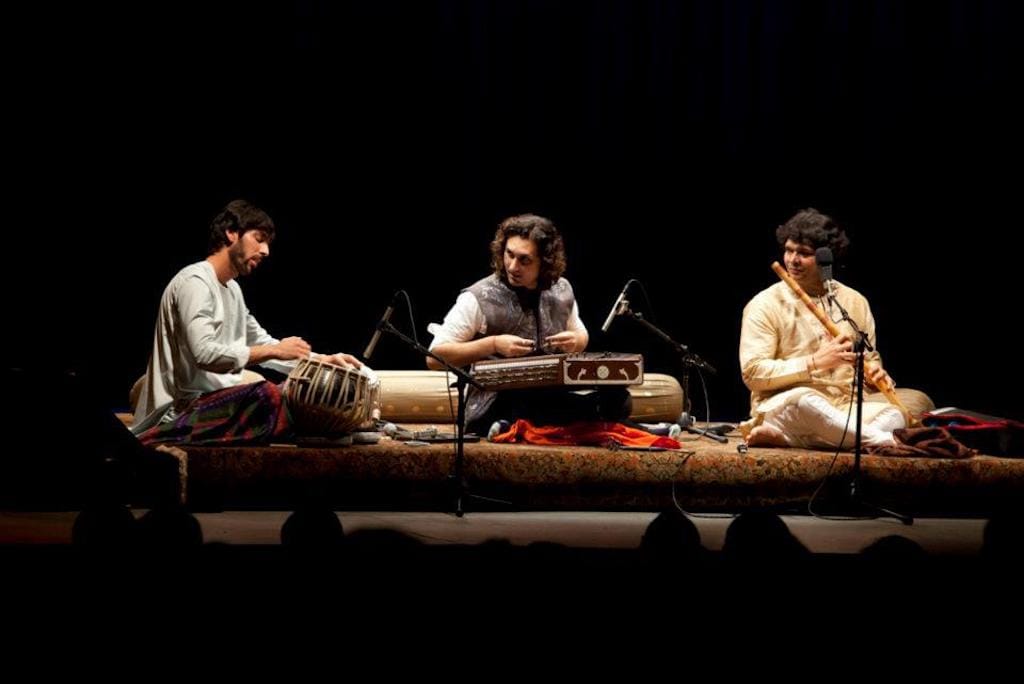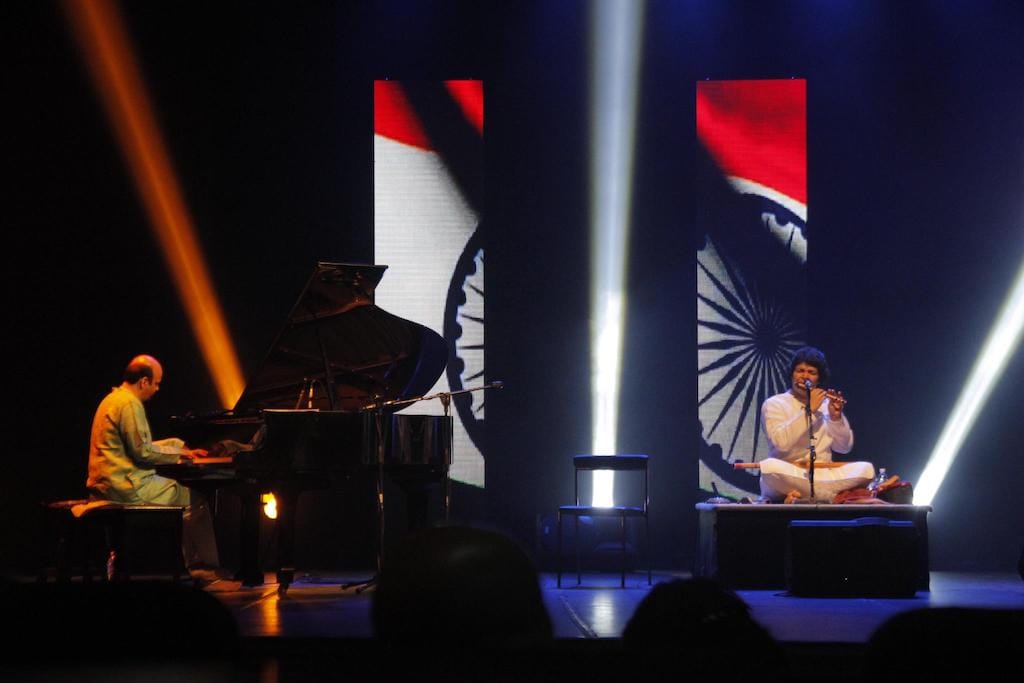Rakesh Chaurasia on Tradition, Global Collaborations, and the Future of Indian Classical Music
Rakesh Chaurasia, a Grammy-winning flautist, balances tradition and innovation in Indian classical music. In this interview, he shares insights on his legacy, collaborations, and the evolving global appreciation for the bansuri.

Born into a family of musical legends, Rakesh Chaurasia has embraced the weight of his illustrious lineage while forging his own artistic identity. As the nephew and disciple of the legendary Pt. Hariprasad Chaurasia, he has seamlessly blended tradition with modernity, captivating audiences worldwide with his expressive mastery of the bansuri.
From classical performances at prestigious festivals to ground-breaking collaborations with global icons like Béla Fleck and Edgar Meyer, Rakesh has expanded the scope of Indian classical music, making it more accessible to diverse audiences. His two Grammy wins for As We Speak marked a historic achievement, solidifying his place as a global ambassador of Indian music.
In this conversation, Rakesh reflects on his musical journey, the evolving perception of Indian classical music, and the delicate balance between preserving authenticity and embracing innovation.

Serenade Team: As the nephew and disciple of Pt. Hariprasad Chaurasia, how have you balanced preserving his legacy while developing your own unique style?
Rakesh Chaurasia: As the nephew and disciple of Pt. Hariprasad Chaurasia, I carry a significant responsibility. With the name 'Chaurasia' comes an added sense of duty. Over the years, I have endeavoured to internalize Babuji's music as much as possible while seamlessly blending my own style, which has a contemporary touch.
ST: The bamboo flute is a deceptively simple instrument yet profoundly expressive. What aspects of playing the bansuri do you find most challenging and rewarding?
RC: The bansuri is unique in that it lacks strings—only the human breath serves as the medium for producing sound. Controlling one's breath correctly is crucial, as is maintaining the right posture. Coordinating finger movements with breath control to play melodies across different scales is also a key challenge. While these aspects require discipline, the rewards are immense. The bansuri is an extremely versatile instrument that blends effortlessly with various genres of music. Unlike stringed instruments, a flautist never has to worry about tuning. On a lighter note, since I always carry my instrument onboard, the chances of lost baggage are minimal!

ST: Winning two Grammys for As We Speak was a historic moment for Indian classical music. Can you share what this achievement means to you and its impact on your musical journey?
RC: First and foremost, I would like to express my gratitude to Zakir Bhai for giving me this opportunity. Bringing home two Grammys is not just a personal milestone but also a proud moment for our country. This recognition has certainly elevated my position as a performing artist. Even a year later, the accolades continue, and it is truly heartening to see Indian classical music being celebrated on such a grand stage.
ST: You’ve worked with icons like Ustad Zakir Hussain, Béla Fleck, and Edgar Meyer. How do collaborations with artists from different musical traditions shape your approach to music?
RC: Musical exchange fosters a deeper understanding of global traditions. Blending elements from different styles encourages me to innovate, push boundaries, and create fresh sounds. One of the greatest advantages of collaboration is reaching wider audiences across the world.
ST: You’ve explored fusion and contemporary music while remaining deeply rooted in classical tradition. How do you navigate the balance between innovation and authenticity?
RC: Innovation is essential for growth and evolution in music. It keeps one’s work fresh and introduces new audiences to Indian classical music. At the same time, authenticity is equally important, as it ensures a genuine connection with listeners. To maintain this balance, I draw from my personal experiences, cultural background, and classical training while also experimenting with new techniques, genres, and technologies. This allows me to create a sound that feels true to myself while still exploring new creative possibilities. Ultimately, it is a dynamic and ongoing process.

ST: Having performed at major international festivals, how do you see the global perception of Indian classical music evolving?
RC: Legends such as Pt. Hariprasad Chaurasia, Pt. Shivkumar Sharma, and Ustad Zakir Hussain have played a pivotal role in popularizing Indian classical music worldwide, far beyond the Indian diaspora. It is now up to our generation to uphold and further this legacy. While Indian classical music remains pure, meditative, and serene, we have also embraced global influences to appeal to wider audiences. Over the years, there has been a significant rise in international festivals showcasing Indian classical music, reflecting its growing global appreciation.
ST: You have been trained in the traditional guru-shishya system. How do you see this teaching method evolving for the next generation of classical musicians?
RC: The traditional guru-shishya system involved students living with their gurus, allowing them to learn not only music but also valuable life lessons through daily interactions. My guru, Pt. Hariprasad Chaurasia, continues to teach in this traditional manner at Vrindaban Gurukuls in Mumbai and Orissa, where students reside and train under his guidance. I, too, visit these gurukuls regularly to conduct teaching sessions. However, with advancements in technology, teaching methods have evolved. Online sessions have become prolific, enabling students from around the world to learn Indian classical music. Our music has now reached homes in the most remote corners of the world, and we have learned to adapt to these new modes of instruction.

ST: With so many accolades and achievements, what are your next artistic or professional goals? Are there any dream collaborations or projects you’re excited about?
RC: I am deeply grateful for all the accolades that have come my way. For any artist, the ultimate goal is to remain true to their craft. Every concert presents an opportunity to excel, and there is no ‘finish line’ in this journey. As for projects and collaborations, I take on those that truly resonate with me, push me beyond my limits, and allow me to create something unique.
ST: Milap is celebrating its 40th anniversary with an exciting Spring 2025 season, showcasing a diverse line-up of Indian classical musicians. What does it mean to you to be part of this milestone season, and how do you see Milap’s role in shaping the appreciation of Indian classical music in the UK?
RC: Congratulations! Milap has played a significant role in spreading the joy of Indian classical music. Sustaining this mission for 40 years is truly commendable. Your three-pronged approach—Experiences, Learning, and Development—makes it a holistic endeavour. I am delighted to be part of this milestone season and extend my best wishes to Milap for its ongoing journey.
Experience the brilliance of Rakesh Chaurasia live at The Tung Auditorium, Liverpool, on Sunday, 16th March 2025, at 7 PM.





